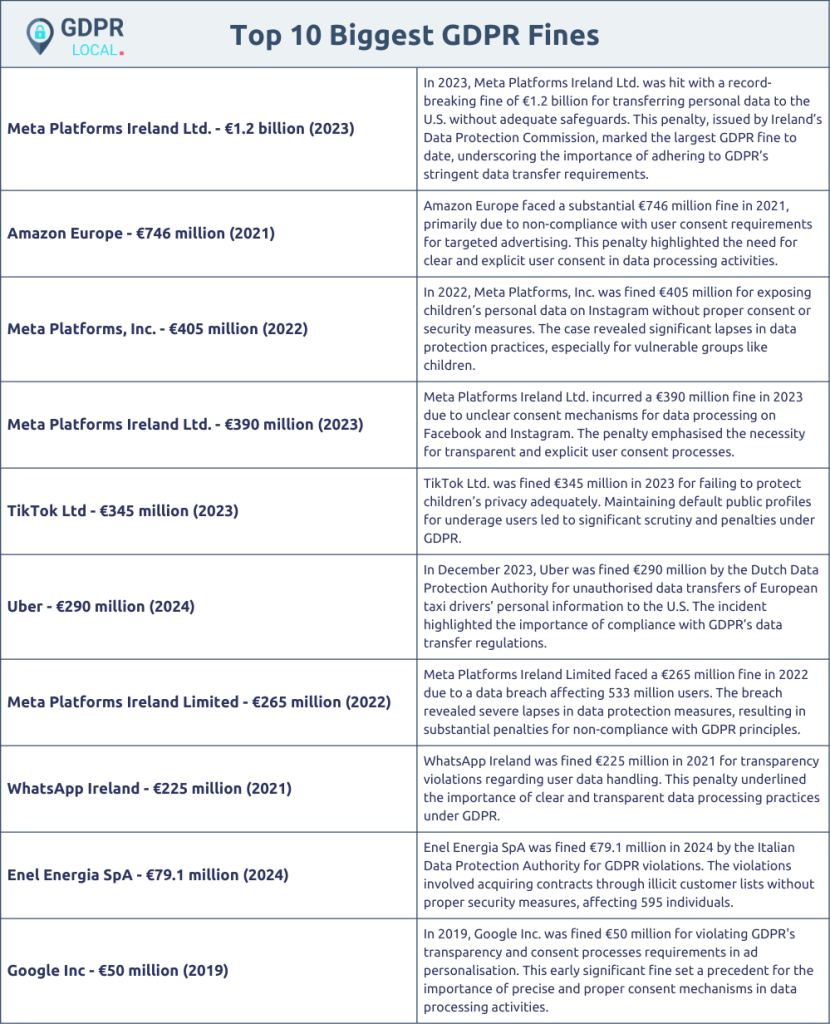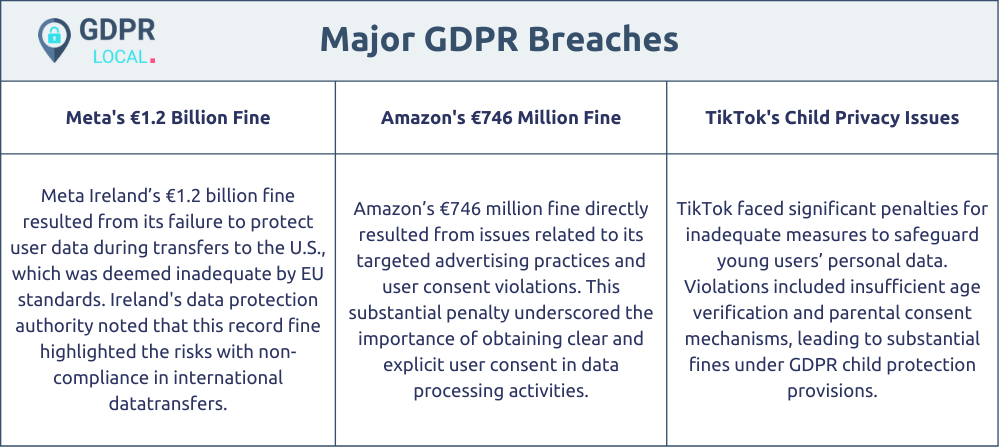
Biggest GDPR Fines: Data Breaches and Penalties
What are the most significant GDPR fines ever issued? This article covers the most substantial fines and the key reasons behind these hefty penalties.
Key Takeaways
• GDPR fines have significantly escalated, totalling approximately €5.88 billion by January 2025, reflecting rigorous enforcement and the seriousness of data protection violations.
• Recurrence of fines among major companies like Meta and Google indicates ongoing compliance issues, emphasising the need for explicit user consent and transparent data handling practices.
• To avoid hefty penalties, organisations must implement robust security measures, ensure precise consent mechanisms, and conduct regular compliance audits to identify and rectify potential gaps.
Top 10 Biggest GDPR Fines
The growing list of top fines underscores the serious consequences of data breaches and non-compliance as GDPR enforcement gains momentum.
These fines serve as cautionary tales for businesses worldwide.

Significant Trends in GDPR Fines
The landscape of GDPR fines has evolved, revealing several significant trends. By January 2025, GDPR fines had totalled approximately €5.88 billion. This substantial figure reflects the increasing severity of penalties and the growing vigilance of regulatory authorities like the Irish Data Protection Commission.
Compliance audits are crucial for identifying gaps and reducing the risk of fines. Below are the trends driving these penalties.
Increasing Penalty Severity
GDPR fines have consistently increased, with record penalties like the €1.2 billion fine on Meta Platforms Ireland Ltd. Factors such as the nature of the violation, company cooperation during investigations, and past infringements play a role in determining penalty severity.
The introduction of GDPR has empowered authorities to impose fines of up to 4% of a company’s annual turnover.
Recurring Offenders
Meta and Google have consistently faced multiple sanctions under GDPR for various breaches, indicating a pattern of non-compliance. Maintaining compliance and transparent communication practices can significantly mitigate the risk of recurring data breaches and fines.
Clear communication about customer data collection and processing personal data methods is crucial for obtaining valid consent from individuals regarding data subject requests.
Focus on Data Transfers
International data transfers have come under intense scrutiny, with significant penalties like Meta’s €1.2 billion fine highlighting non-compliance risks. Adhering to GDPR data transfer rules is crucial for avoiding substantial fines and protecting sensitive personal data.
Rulings like Schrems II have intensified this focus, emphasising the need for adequate safeguards in international data transfers.
Factors Influencing GDPR Fines
The fines imposed under GDPR are evaluated individually, influenced by the specific circumstances of each case. Factors including the nature and severity of the violation, company cooperation during investigations, and the number of affected data subjects play pivotal roles in determining penalties.
Nature and Severity of Violation
The type of violation and its implications for individuals are crucial in determining the penalties imposed. For example, Meta’s substantial fines resulted from inadequate protection for personal data transferred outside the EU. Previous violations can also lead to increased penalties if a pattern of negligent behaviour is established.
Company Cooperation and Past Infringements
The level of cooperation during investigations significantly impacts the outcome of GDPR penalties. The three-year investigation into WhatsApp’s violations reflects the company’s cooperation level.
Nature, gravity, duration, and intent behind the infringement are all considered when determining fines.
Number of Affected Data Subjects
The number of individuals impacted by a data breach significantly influences the penalties. The greater the number of affected data subjects, the more severe the potential fines, reflecting the scale of harm. This critical factor underscores the importance of robust data protection measures to mitigate the risk of significant penalties.
Case Studies of Major GDPR Breaches
Reviewing major GDPR breaches offers valuable insights into the consequences of non-compliance. Companies like Meta and Google have faced recurring fines, indicating systemic issues in their data-handling practices.
The focus on international data transfers has intensified, with regulators emphasising strict adherence to the General Data Protection Regulation standards.

How to Avoid GDPR Fines
Avoiding GDPR fines requires proactive measures and continuous compliance efforts, including adequate security measures, transparent data practices, and regular compliance audits.
Implementing Adequate Security Measures
Adequate security measures are critical for protecting sensitive data and maintaining GDPR compliance. Regular training and adherence to GDPR foster a culture of data security, mitigating the risk of severe penalties.
Ensuring Transparent Data Practices
Clear consent mechanisms are vital for complying with GDPR and maintaining user trust. Transparency in handling user data, in line with general data processing principles, is foundational for avoiding penalties.
WhatsApp’s €225 million fine for transparency violations is a cautionary tale.
Regular Compliance Audits
Regular GDPR compliance audits ensure organisations maintain adequate security measures and transparent data practices. These audits help identify compliance gaps and rectify potential issues before they lead to data breaches or penalties.
Summary
The top 25 GDPR fines underscore the significant financial risks associated with non-compliance. From Meta’s record €1.2 billion fine to TikTok’s child privacy issues, these cases highlight the importance of robust data protection measures and transparent data practices. Continuous compliance efforts, regular audits, and proactive security measures are essential for avoiding severe penalties and maintaining user trust.
Businesses can be inspired by the understanding that GDPR compliance is not just a legal obligation but an opportunity to build trust and demonstrate a commitment to data protection. By prioritising privacy and transparency, companies can foster a culture of compliance and protect their reputations.
Frequently Asked Questions
What is the largest fine for data breaches in the UK?
The largest data breach fine in the UK is £20 million, issued to British Airways for a cyber attack that compromised the personal and financial information of over 425,000 customers. This fine underscores the critical importance of maintaining robust IT security measures.
What is the largest GDPR fine ever?
The largest GDPR fine to date is €1.2 billion, imposed on Meta. This fine reflects the serious financial repercussions of data protection regulation violations.
Why was Amazon fined €746 million under GDPR?
Amazon was fined €746 million under GDPR for failing to comply with user consent requirements for targeted advertising. This violation highlights the importance of adhering to data protection regulations.
How does the nature of a GDPR violation influence the penalty?
The nature of a GDPR violation plays a crucial role in determining the penalty, with more severe infringements, particularly those affecting sensitive data, leading to higher fines. Thus, the potential impact on individuals is a key factor in assessing penalties.
What role does company cooperation play in GDPR investigations?
Company cooperation during GDPR investigations significantly influences the outcome. A cooperative stance may reduce the severity of penalties, whereas non-cooperation can lead to more severe consequences. Therefore, fostering a collaborative approach is crucial for companies facing such investigations.